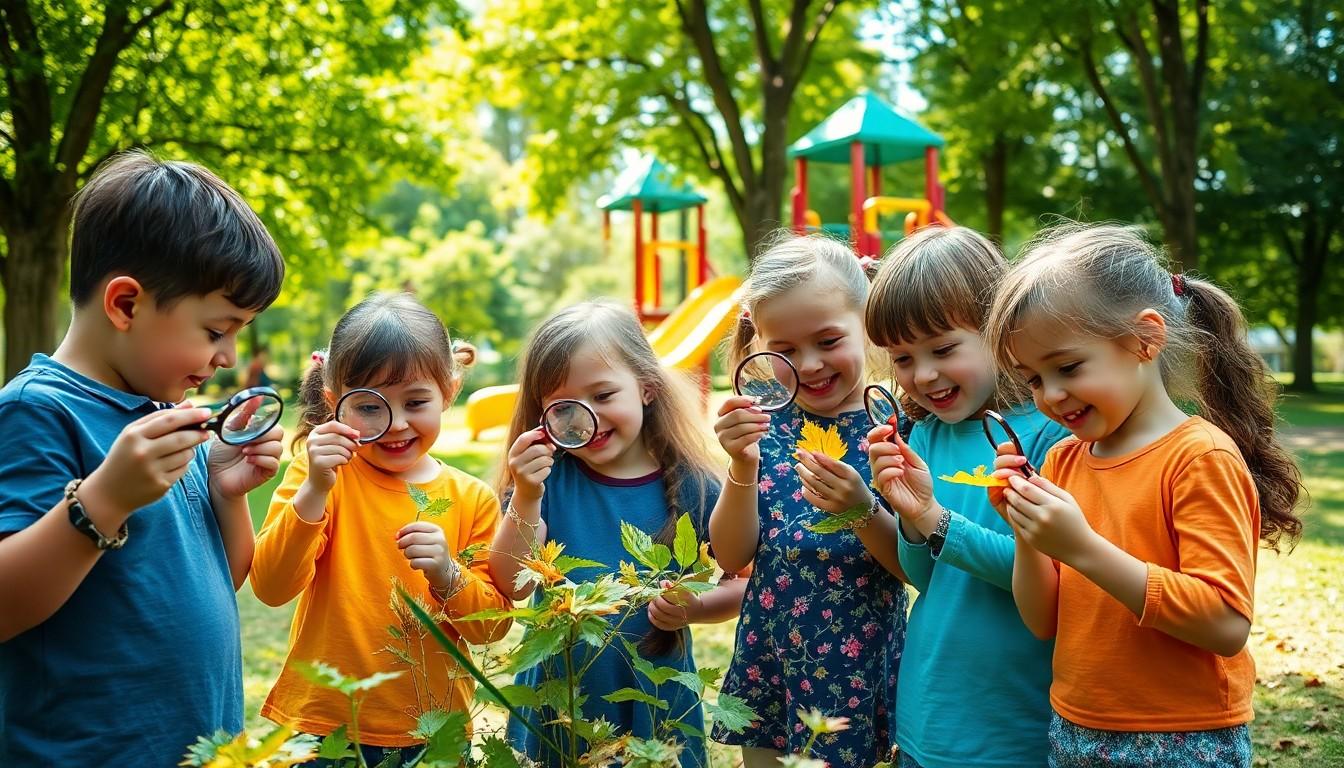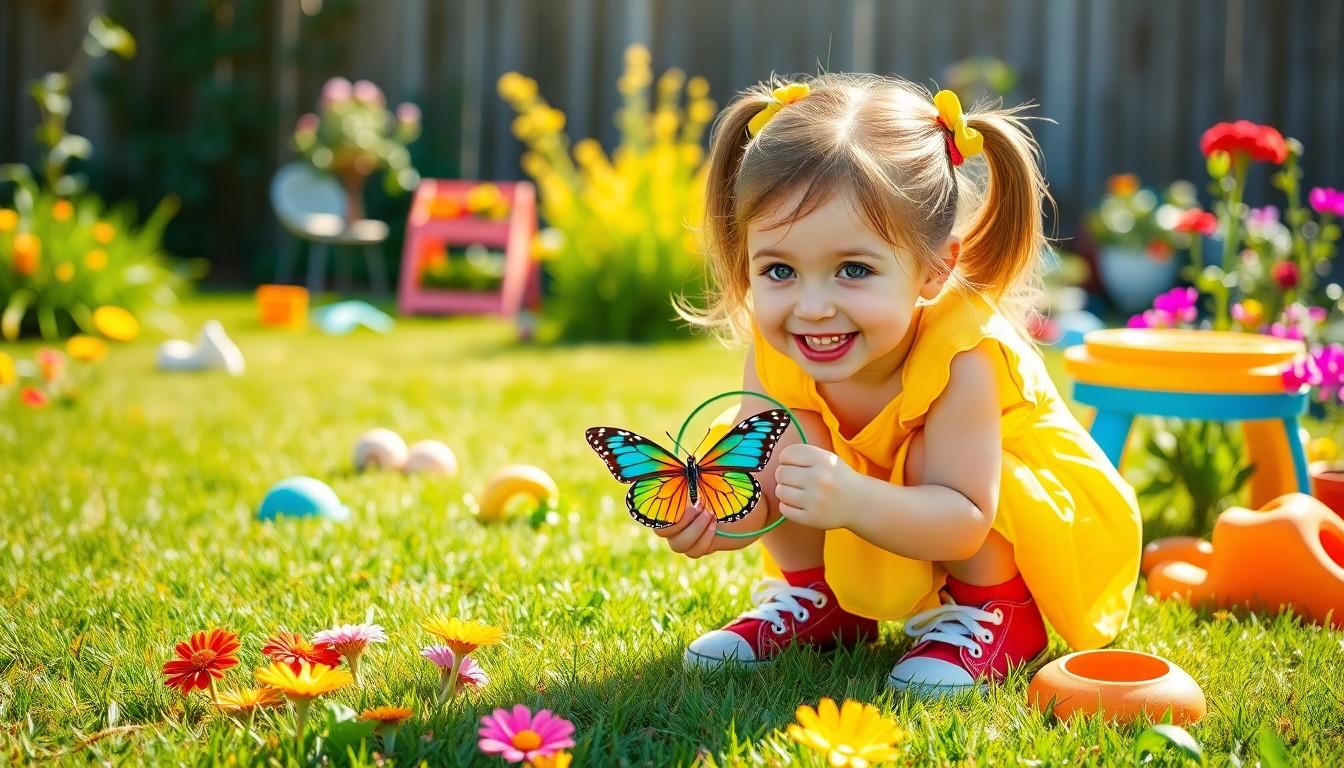When it comes to preschoolers, keeping them entertained can feel like a full-time job. Luckily, the great outdoors offers a treasure trove of fun activities that’ll have them giggling and learning at the same time. From nature scavenger hunts to mini obstacle courses, outdoor adventures are not just a way to burn off that endless energy—they’re also a chance to spark curiosity and creativity.
Imagine a world where kids explore, climb, and discover, all while soaking up sunshine and fresh air. Outdoor activities provide the perfect playground for little ones to develop essential skills, from teamwork to problem-solving. So grab those tiny sneakers and get ready to unleash the joy of outdoor play! It’s time to turn that backyard into a wonderland of excitement and laughter.
Outdoor Activities For Preschoolers
Outdoor activities provide numerous benefits for preschoolers, enhancing both their physical and emotional development.
Physical Development
Physical activities like running, jumping, and climbing help preschoolers build strength and coordination. Engaging in outdoor play encourages gross motor skill development through activities such as riding bikes or playing tag. Improved balance and agility are also significant outcomes of these experiences. Additionally, experiences outdoors promote cardiovascular health through increased physical exertion. Exposure to various terrain types, such as grass and sand, allows preschoolers to adapt their movements, further enhancing their physical abilities.
Emotional Well-Being
Outdoor play significantly contributes to emotional well-being in preschoolers. Freedom to explore nature fosters independence and boosts self-confidence. Social interactions with peers during activities develop important interpersonal skills. Experiencing the outdoors also provides opportunities for stress relief, allowing preschoolers to express emotions healthily. Feeling connected to the environment can instill a sense of peace and fulfillment. Engaging in imaginative play outdoors further stimulates creativity, enhancing emotional growth and resilience.
Types Of Outdoor Activities

Outdoor activities for preschoolers encompass a variety of fun and educational experiences that enhance their development. Engaging in diverse activities helps children gain essential skills while enjoying the outdoors.
Nature Exploration
Nature exploration encourages curiosity about the environment. Preschoolers can participate in activities like nature scavenger hunts to discover plants and insects, promoting observation and critical thinking. Simple tools like magnifying glasses can enrich their experience by allowing close-up observations. Collecting leaves or rocks fosters creativity and aids in early science learning. Bringing children outdoors to explore different biomes, such as forests or wetlands, broadens their understanding of ecosystems.
Playgrounds and Parks
Playgrounds and parks provide structured settings where preschoolers can engage in physical play. Swinging, sliding, and climbing enhance motor skills while encouraging social interactions with peers. Parks often have open spaces for running and playing ball games, which teach teamwork and cooperation. Equipment like balance beams or monkey bars develops strength and coordination, making playtime both fun and beneficial. Parents can encourage group play to foster friendship-building and problem-solving skills among children.
Sports and Games
Sports and games serve as excellent means for preschooler engagement. Simple activities like tag or soccer foster physical fitness and social interaction. Organized games can introduce children to the principles of teamwork and sportsmanship, essential skills for future sports participation. Preschool-targeted activities, such as modified relay races, focus on developing coordination and agility. Regular involvement in sports and games cultivates a love for physical activity, setting the foundation for an active lifestyle.
Safety Considerations
Ensuring safety during outdoor activities for preschoolers is crucial. Parents should assess their environment and supervise their children closely.
Environment Assessment
Start by checking the play area for potential hazards. Look for sharp objects, uneven surfaces, or toxic plants. Examine the play equipment to ensure it’s safe and age-appropriate. Make sure fencing or barriers are intact, preventing unexpected escapes. Evaluate the weather conditions before heading outside, as extreme temperatures can pose risks. Provide shade and hydration during hot days. Keep in mind that the outdoor space should facilitate exploration but remain safe.
Supervision Needs
Close supervision is necessary during all outdoor activities. Adults should remain within sight and sound of children at all times. Organize group play to better manage safety while encouraging social interaction. Assign clear boundaries, especially in open areas. Intervene immediately if children engage in risky behaviors or venture too far. Establish clear communication with children about safety rules during play. Remember that proper supervision helps prevent accidents and fosters a secure environment for exploration.
Tips For Parents And Educators
Engaging preschoolers in outdoor activities enhances their development and enjoyment. Here are key strategies for parents and educators to maximize these experiences.
Encouraging Exploration
Fostering exploration in children leads to enhanced curiosity and critical thinking. Create nature scavenger hunts where children search for various plants, animals, and natural objects. Provide them with simple tools like magnifying glasses to investigate their surroundings. Allowing preschoolers to navigate through different terrains stimulates their sensory experiences. Highlighting the importance of observation encourages them to ask questions about what they see and hear. Conversations about the environment can further deepen their understanding. Embracing spontaneity in outdoor settings cultivates their creativity and problem-solving skills.
Setting Up Playdates
Organizing playdates in an outdoor setting promotes social skills and teamwork among preschoolers. Choosing local parks or backyards allows children to interact in a safe environment. Coordinating activities like group games and relay races encourages cooperation and communication. Invite familiar friends to help children feel comfortable and engage more readily. Establishing regular playdate routines can leave a lasting impact on their social development. Setting clear boundaries for playtime keeps everyone safe and focused. Encouraging parents to participate can add an extra layer of fun, creating a vibrant community atmosphere.
Creating Lasting Memories
Outdoor activities are essential for preschoolers’ growth and development. They provide opportunities for physical exercise while nurturing creativity and social skills. By engaging in nature exploration and structured play, children can enhance their motor skills and build confidence.
Parents play a crucial role in ensuring safe play environments. By assessing potential hazards and maintaining close supervision, they can foster a secure setting for exploration. Encouraging regular outdoor playdates not only strengthens social bonds but also enriches the overall experience.
Ultimately, embracing outdoor activities can lead to happier and healthier preschoolers. It’s a simple yet effective way to support their development while creating lasting memories.

